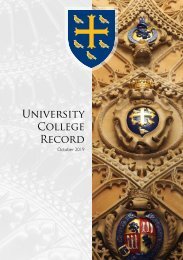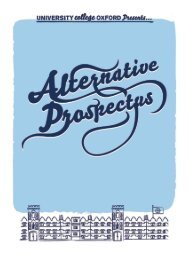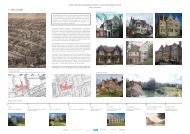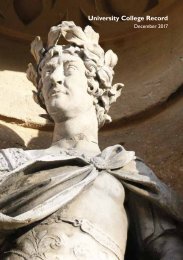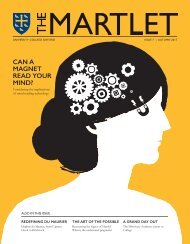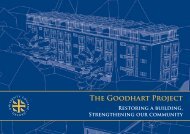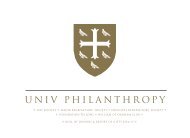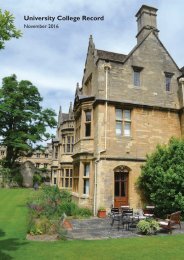Univ Record 2018
University College Oxford Record 2018
University College Oxford Record 2018
Create successful ePaper yourself
Turn your PDF publications into a flip-book with our unique Google optimized e-Paper software.
Building in their later years,<br />
and finding it rather difficult<br />
to cook for themselves,<br />
having rarely had to do so, Sir<br />
Maurice and his wife would<br />
regularly bring them suppers.<br />
Outside <strong>Univ</strong>, Sir Maurice<br />
played a significant role in<br />
<strong>Univ</strong>ersity affairs. He was<br />
Treasurer of the Oxford<br />
Union from 1954-72, and he<br />
served on the Hebdomadal<br />
Council from 1969-75,<br />
but perhaps his greatest<br />
With Lord and Lady Redcliffe-Maud<br />
contribution to Oxford was to<br />
serve on the Franks Commission of Inquiry into the <strong>Univ</strong>ersity from 1964-6.<br />
Sir Maurice left <strong>Univ</strong> in 1977 on being appointed Vice-Chancellor of the <strong>Univ</strong>ersity<br />
of Leicester. However, he returned to Oxford in 1987, when he was elected Rector<br />
of Lincoln College. He retired in 1994. He was knighted in 1988. His wife Dorothy<br />
predeceased him in 1998, and he leaves a son and three daughters.<br />
A fuller tribute to Sir Maurice will appear in next year’s <strong>Record</strong>.<br />
JOHAN VAN ZYL STEYN, LORD STEYN OF SWAFIELD (Stellenbosch <strong>Univ</strong>ersity)<br />
died on 28 November 2017 aged 85. He came up to <strong>Univ</strong> as a Rhodes Scholar to read<br />
Law, and was elected an Honorary Fellow in 1995. A shortened version is given here of<br />
a tribute given by Lord Thomas of Cwmgiedd:<br />
Johan Steyn was born in Stellenbosch in 1932. His father was a leading Afrikaner<br />
legal academic and a founding member of the Faculty of Law at Stellenbosch <strong>Univ</strong>ersity,<br />
but died when Johan was an infant; his grandfather had fought against the British in the<br />
Boer War and although captured and held a prisoner, he had made a resourceful escape.<br />
In due course Johan read Law at Stellenbosch <strong>Univ</strong>ersity and then as a Rhodes Scholar<br />
at <strong>Univ</strong>ersity College, Oxford. On his return to South Africa, he was called to the bar<br />
and developed a highly successful legal practice in Cape Town – he was much in demand<br />
with a very varied practice; on occasions he was instructed to act for the government.<br />
In 1970 he was appointed a Senior Counsel – a very young appointment in South<br />
Africa and symbolic of his meteoric legal career. He decided to emigrate to the UK – he<br />
found the regime of apartheid repugnant – a fact that without doubt strongly influenced<br />
his outlook when he became a judge. He was called to the bar by Lincoln’s Inn in 1973<br />
and had to do pupillage; his reference for pupillage was from the then Chief Justice of<br />
South Africa; it was the best reference that a pupil has ever had. It simply said that if he<br />
had remained in South Africa he would have become Chief Justice.<br />
He did his pupillage at 4 Essex Court and developed a commercial practice in<br />
shipping insurance and arbitration from a tiny room overlooking a lightwell in rooms in<br />
New Court. That practice grew at a considerable pace and he was soon leading others,<br />
even before he took silk in 1979 – just six years after his call at Lincoln’s Inn.<br />
62





